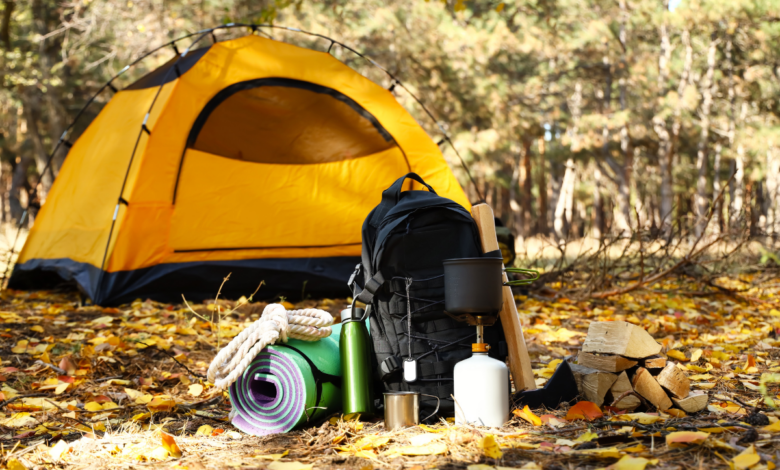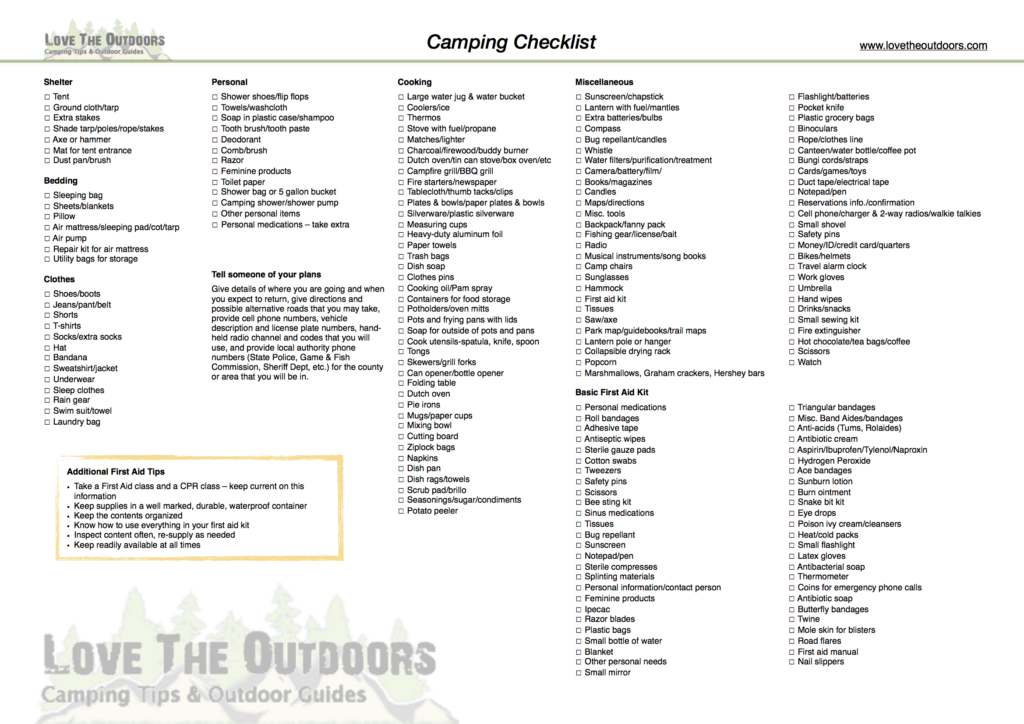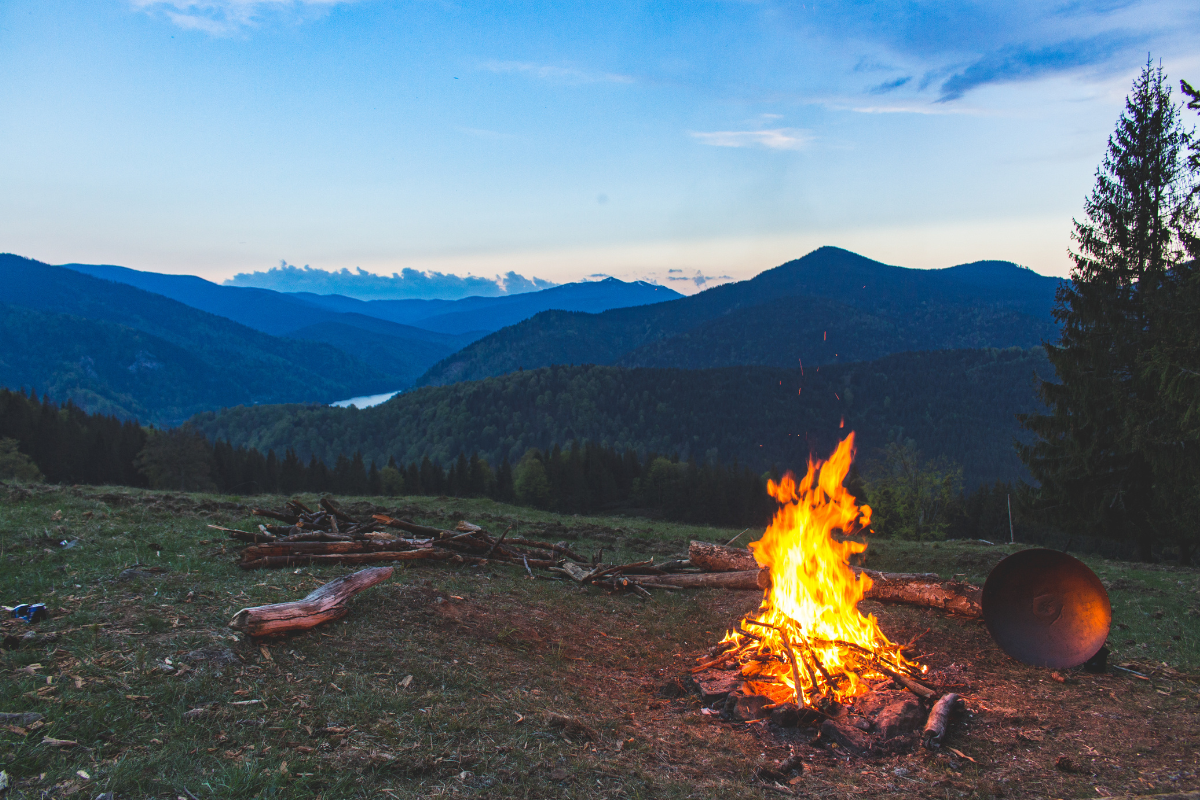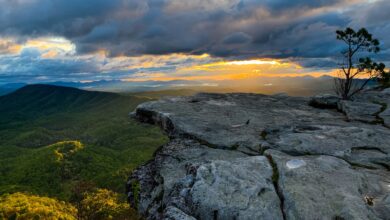24 Tent Camping Tips and Tricks for Beginner Campers

Reaching the campsite late was one of the many mistakes I made during my first camping trip of the season. Even after two decades, the memories of that cold and wet night remain sharply imprinted in the grey cells of my brain.
The point is, common camping mistakes can screw up your adventure in more ways than you can imagine. And not everyone grows up as a camper. As a rookie, there are some basic rules that you need to keep in mind when you are heading into the wilderness.
Listed below are 24 tent camping tips and tricks to help you make the best of your next camping trip. Take a look.
1. Choose a campground within a 4-hour drive for short trips
If you are heading for a short weekend camping trip, make sure to reach the camping ground quicker. It is best that you pick a campsite that is within a 4-hour drive so that you arrive early. That way, you will be able to spend more time amidst nature and less time on the road.
Picking a spot close to your home for your first camping trip makes a lot of sense. For one, you can easily turn back if something goes wrong. Moreover, it will not be a big issue if you have missed packing a piece of essential gear. Keeping the distance short will also help you to start slow and get a feel for a camping trip.
2. Pack essential toiletries, including baby wipes and hand sanitizer
Unleashing one’s wild side during camping- not my schtick. Basic hygiene is important for me even in the wilderness. Plus, packing the essential toiletries helps you to stay prepared for emergencies. For example, baby wipes have helped me clean up spills on the tent floor more times than I remember.
I prefer using a water-resistant bag that is designed specifically for toiletries. The items you pack will depend on the duration of the trip. Some essential items that you can pack include soaps, hand sanitizers, toothbrushes, toothpaste, razors, shaving cream, female hygiene products, combs, body wipes, and more.
3. Practice setting up your tent at home to reduce stress on-site
How difficult can pitching a tent be? All you need to do is fix the poles and secure the fly with guy lines. Right?
Wrong!
Setting up a tent for the first time needs some practice. Trying a new tent is a must before you head outside with it. Worst-case scenario- you discover your tent is faulty while trying to set it up in the campsite.
Quite simply, you need to know the type of tent you are carrying and the accessories needed for it, if any. Also, you need to know how you can secure the tent properly. A tent collapsing or blowing away on a windy night is not a situation you would like to handle.
Not to forget, you need to pack the tent in the right manner by reversing the process. The good news is that the process is not so difficult once you get the hang of it.
4. Store all scented items in food lockers to avoid attracting bears
One of the most unnerving experiences of camping is hearing the sounds of a foraging bear patrolling around on a pitch-black night. More so when you are camping alone in bear country.
Since bears are attracted by the smell of food and trash, keeping food items lying around in the open is one of the worst things you can do. Storing food and beverages in bear-proof metal lockers is a safe option. The idea is to keep the campsite clean and odor-free.
It’s best to cook and eat your food away from the tent. Also, keep the bear-proof container at least 100 yards away from the tent for safety.
Check out Canadian bear hunting with Mark Peterson:
5. Use biodegradable soap and a two-sink system for dishwashing
By using biodegradable products while camping, you will minimize introducing pollutants into the environment. A biodegradable soap will break down into natural components without releasing toxic chemicals. Ideally, you should move at least 200 yards away from a water body while using a soap.
Not many campsites have proper dishwashing facilities, so you need to set up your system. The best way is to use a two-sink system- one for washing dishes, and another for rinsing them. You can use warm water for dishwashing and cold water for rinsing.
Before disposing of the dishwater in a designated spot, strain out the food crumbs. If there is no designated spot, disperse the water over a large area to minimize any impact.
6. Bring a larger tent than you think you’ll need for extra space
Honestly, choosing the right tent size is tricky. In theory, you will need at least 25 inches of width and 80 inches of length for an average person. But that may not work in the real world.
If you are carrying one tent for a family of four, best to pick a 6-person tent. A bigger space will allow everyone to store their gear in the right manner. Besides, kids may love to spread around in a larger living space. Beyond that, I have found tents cramped with too many people having ventilation issues. So, going with a roomy tent makes a lot more sense.
For two people, I prefer using a three-person tent to make things more comfortable. That also goes if you are camping with a pet. You will have to carry a bit of extra weight, but it is worth it.
7. Make a checklist of camping essentials to ensure you don’t forget anything
When I started camping, I used a standard checklist to ensure that I never forget packing any essential items. Minimalist camping does have its charms, but to start with, you might want to pack all the necessary gear to be more comfortable.
Besides, there are multiple categories with various items under each. These include campsite and sleeping gear, camp cooking essentials, clothing, health and hygiene products, tools, and other essentials.
The list of must-haves and optional items will vary based on individual preferences. Since the list is long, having a camping essentials checklist helps. Make sure to check out the campground amenities before you pack.

8. Learn how to purify water in case of an emergency
Learning how to purify water in the backcountry is a key survival skill that comes under the camping basics for beginners. It is a must when camping in areas where there is no water treatment infrastructure.
In case, you are heading into uncharted terrain and get stuck due to weather conditions, this skill will save your life. Then again, you need to plan about removing the waterborne pathogens so that there is enough water when you get thirsty.
Common methods for purifying water include boiling, using disinfectants, filtration, and UV light treatment. You should use at least one of these purification methods before drinking water from any natural source, even if the water looks clean.
9. Cook dinner before sunset to avoid bugs and visibility issues
It is best to cook before darkness falls, especially if you are in a secluded campsite. Firstly, outdoor cooking on a campfire or camp stove can attract a ton of bugs during the evening. A bug-flavored dish is not my choice for a camping meal.
Moreover, bears and other animals are more active in the dark and can be drawn by the aromatic stew you might be brewing. Besides, I find cleaning up the cooking area easier before the sun sets.
That said, you can go ahead and cook in the dark if you have sufficient light sources. But for me, preparing the meal in a beautiful location while the sun is setting is a lot more fun.
10. Pack extra food and water for emergencies
No matter the type of camping trip you are heading for, you may have to face adverse situations without notice. A sudden natural disaster can turn a favorable campsite into an unfavorable location. Ideally, you should pack a three-day supply of extra food and water for long trips.
Packing some extra nonperishable food items makes a lot of sense. I prefer packing Items like dehydrated meals, canned soups, meat and veggies, and dried fruits. When it comes to drinking water, the suggested volume is 1 gallon per person per day. If your camping site has a water source, carrying water filters should be good enough.
11. Ensure your campfire is completely extinguished to prevent wildfires
Sitting by the campfire and enjoying the warmth is fun, but do not forget that campfires are a primary cause behind wildfires each year. A vital camping tip for beginners is to select a flat, open patch away from any flammable objects for building a campfire. Dig the firepit on bare soil by removing all dry leaves, grass, and needles from the spot.
Experts suggest not to build a campfire in dry and windy conditions. Wind can carry flying embers over long distances and cause fire hazards. In any case, always keep the size of the fire under control and attend to it at all times.
Another essential point is making sure to extinguish the campfire completely by dousing it with water. Use a stick to expose all the wood and embers and soak all of them, not just the red-hot ones.

12. Test your headlamp and lantern batteries before leaving
Carrying a camping lantern or headlamp with a worn-out battery is a mistake that you do not want to make. Even with a light, things can get tricky if you are stuck on a mountain trail outside the camp boundaries in the dark. Imagine what will happen, if your headlamp battery dies and you still need to cover some distance through approaching darkness. There have been numerous incidents where hikers stuck in the dark had to be rescued by authorities.
If you have stored the headlamp for a long period by removing the batteries, make sure to recharge them and check if they are working. Carrying extra batteries is also a good idea. They are compact and do not weigh much.
13. Opt for dehydrated meals for easy cooking and cleaning
Sticking to dehydrated meals works well for me for short camping trips. What I like about dehydrated or freeze-dried camping meals is the fact that they are easy to cook and super lightweight.
Just pour some hot and cold water, and your meal is ready. If you are an ounce-counter and do not prefer carrying full-fledged kitchen gear, dehydrated foods are the best option while camping.
At the same time, they offer enough nutrition to ensure a wholesome meal. Moreover, dehydrated meals can be stored for longer periods without the risk of spoilage. The good thing is, that they are free from chemical preservatives.
That said, when it comes to choosing between dehydrated and freeze-dried meals, I would go for the latter. Generally, freeze-dried meals not only preserve more nutrients but also taste better.
14. Have a car safety kit and a first aid kit prepared
A car emergency kit will prevent you from getting stranded in a remote location and can help in getting the vehicle back to running. This kit should include items like jumper cables, tire inflators, multi-function tools, etc. In addition, pack reflective cones and flares, that will help you to flag down other drivers at night.
Coming to first-aid kits, An emergency kit for treating minor injuries is a must for every camping trip. Pick a durable kit that is well organized. You can pick a prepackaged first-aid kit or make a DIY kit. That will help you to find the right items quickly during an emergency. I’d also suggest picking a kit with a comprehensive first-aid manual to guide you during emergencies.

15. Follow the “Leave No Trace” principles to protect the environment
So, you are a well-intentioned camper with nothing but love for nature in your heart. Even so, every time you set foot in the wilderness, you might end up disturbing the ecosystem in some way or the other. To minimize that, the Leave No Trace Center for Outdoor Ethics came up with seven principles to help us make a positive impact on nature.
The Leave No Trace principles are not rules to restrain your activity. Rather, they are the best practices that help individuals act responsibly and minimize impacts when visiting a natural setting.
Learning about these principles is necessary before you head out for a camping or hiking trip. Let’s not forget, that treating the environment with respect is our responsibility while camping.
16. Check the weather forecast before your trip to prepare for the conditions
No matter the time of the year, backcountry weather can be uncertain. So, checking the weather before starting a trip is a must. Knowing the weather allows you to make the right decisions during the trip and make any last-minute tweaks in the plan as needed. Usually, short-term forecasts are less accurate, but they will help you to pack the right gear for short trips.
I prefer consulting two different sources for checking the highs and lows in temperature and precipitation. Comparing two different weather models can help you understand weather patterns more clearly.
To understand how the daily weather will vary, check the hourly weather forecasts. You can check the National Center for Environmental Information website for seasonal averages.
17. Understand how to navigate without cell service using offline maps
If you are camping off the grid, you will not have a cell service. So carrying an offline digital map is the best option. These maps offer plenty of practical features like customization, adding markers or pins, and locating coordinates. Learn how to read a topographic map and use these features. In case you lose your way a map can be a lifesaver.
One option is to download Google Maps for offline viewing. Beyond that, other trail-mapping apps like AllTrails Pro and Gaia GPS can be used offline use. You can carry a printed map as well, but digital maps are more updated.
Note that using maps offline will increase the battery consumption of your phone. You need to pack enough battery power depending on the demands of the trip.
18. Learn best practices for wildlife safety to avoid dangerous encounters
Other than bears, you can encounter other creatures like raccoons, skunks, and foxes while camping. While wild animals may seem friendly, feeding them or trying to pet them is not the right idea. If you see animals around, keep your gear protected.
Other than securing the food in a safe place, keep the campsite clean, and dispose of trash in the marked spots. Many campsites have animal-resistant trash cans for this purpose. Also, do not provoke the animals and stay away from young animals.
While venturing for a hike, check for animal tracks or droppings. That will help you to stay alert and stay away from animals. In truth, most animals will not attack unless they are provoked. So, make sure that you give them the right space.
19. Familiarize yourself with going to the bathroom outdoors
Managing human waste by minimizing the environmental effects is a skill that every outdoor enthusiast needs to learn. Ideally, you should use an outhouse or a pit toilet. Pro tip: many campsite toilets have empty rolls. Make sure to carry some toilet paper in your car.
In case there are no toilets around, you need to get off the trail and find a spot away from water bodies. Remember not to use caves or rock shelters that are used by other campers. After finding the right spot, dig a cathole in the ground to bury solid waste, including your toilet paper. While that may sound gross, burying is a good way to cover up your deed.
That said, some sensitive areas may have restrictions on this practice. So, check the local guidelines before proceeding. In that case, you will need to pack the waste out in a wag bag.
20. Plan to arrive early at your campsite to set up in daylight
By arriving early you will have more time to settle down comfortably and familiarize yourself with the surroundings. And that helps when you need to navigate around the campsite at night.
In popular campsites, there may be a long check-in line during a busy weekend. Arriving early is the best way to avoid it. Besides, you may find the best spots already occupied if you arrive late. Worst case scenario- camping near the toilet due to lack of space.
Remember, you will need to haul your gear from the car to the actual camping spot. That distance can vary from 100 feet to a quarter of a mile or more. That is the additional time you need to consider.
21. Choose the right camp kitchen gear, including a stove and cooking utensils
All your dreams of cooking great camping food over the campfire will go up in flames without the right camp kitchen gear. Even if you are not a gourmet, packing the right kitchen gear will save you a lot of effort and improve the overall camping experience.
I prefer to pick versatile and easy-to-use gear that is easy to carry around. Essential equipment includes a camping stove or grill, a camping table. a camping kettle, lightweight cookware, water storage containers, a compact cutting board, essential cutlery, plates, and mugs.
I have seen many people set up their cooking gear on the ground, but using a camping table makes a lot of difference. It minimizes the chances of bugs and dirt getting into your dinner and also reduces the discomfort of being hunched over for hours.
Other items you can add include a cooler, a collapsible sink, a Dutch oven, bear-resistant food containers, trash bags, etc. And yes- don’t forget to pack the can opener or a multi-tool.
22. Buy local firewood to prevent the spread of invasive species.
Wood-infesting species can be destructive to forests and can cause a lot of damage. And guess what? Firewood is a favorite dwelling spot for such invasive insects. Many such insects can survive in the firewood for years and can be transported to a new location by campers.
What if you inspect the firewood closely before buying? Quite simply, these are not bugs you can stomp on with your heavy upland hunting boots. Locating those pin-head-sized insect eggs is impossible with the naked eye.
Now, the term “local” firewood is not clearly defined and firewood regulations can vary based on the state. As for transporting firewood, a distance of more than 10 miles is not a safe option. Also, if you have leftover firewood from your trip, leave it back instead of carrying it home.
Lastly, pick packaged and heat-treated firewood with a USDA APHIS compliance seal or an inspection seal from a state.
23. Respect campground quiet hours and your neighbors’ space
An essential aspect of camping etiquette is to respect the posted quiet hours and your neighbor’s space. Keep in mind that in a tent or a camper, the walls are thinner and the threshold of noise is low. In other words, keep the noise levels down and do not blast music even if it is daytime.
Keep all your items within your camping area and do not walk through an occupied site. It is also necessary to keep pets or children within the boundaries. Switch off lights when not in use as bright LEDs can cause discomfort to some people. In case of any issues, it is best to contact the campground manager.
24. Keep your cooking area separate from your sleeping area
You cannot pick a spot randomly for setting up the cooking area in a campsite. In some sites, there might be fire pits to mark the location of the cooking spot. There are no standard distances to maintain between the two spots. In my experience, choosing a spot at least 100 feet away from the sleeping area is a good idea.
Maintaining the distance between the cooking and sleeping area allows you to avoid any unwanted nocturnal visitors who might get attracted by smells. I choose cooking spots that are downwind from the sleeping spot to let the smell drift in the reverse direction. Ideally, the area should be flat and sheltered from the wind.
FAQs
How do you camp effectively?
There are some camping basics for beginners that you need to know for camping effectively. It is important to plan effectively, choose the right gear, and start preparing days before you leave for the trip. In addition, make sure to learn about what to wear for hiking or camping trips.
How do beginners start camping?
Beginners should seek help from an experienced person to guide them through their first camping trip. The other option is to opt for guided camping tours from reputed organizations.
Is it safe to sleep outside while camping?
It is mostly safe to sleep under the open sky but you need a comfortable sleeping system and proper clothing to protect you from the cold. However, you can’t sleep outside the tent if it’s raining. Also, check if there are wildlife threats or issues with bugs and small scurrying animals.
Final Thoughts
If you are interested in stepping into the world of outdoor recreation, camping is one of the best ways to get started. Using these tent camping tips for beginners as basic guidelines for your first camping trip will help in making the experience more enjoyable.
With so many dos and don’ts, camping may seem intimidating. But do not stress yourself by trying to do it perfectly the first time. My first camping trip was far from perfect. Even so, I ended up planning for the next trip sooner than I imagined.
So go ahead and take the next step.




